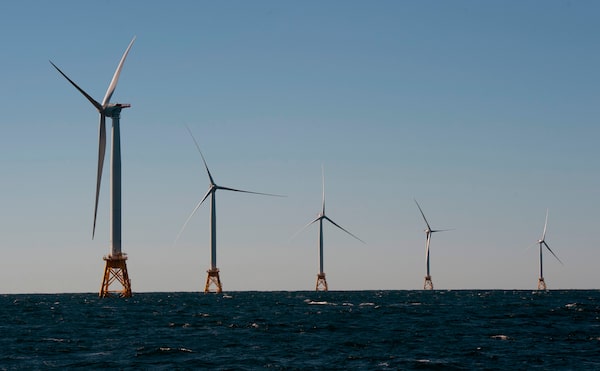
If some investors believe that investing in efforts to curb emissions is a silly tree-hugging venture rather than a serious way to score big returns, GMO believes that the prospect of long-term market-beating returns can now drive the strategy.DON EMMERT/AFP/Getty Images
Let’s say you don’t care about climate change, you loathe government carbon taxes and you can’t stand the idea of wind turbines dotting the landscape. Is a climate-change investing strategy still worth considering?
It probably is, and for a handful of compelling reasons outlined in a white paper from GMO LLC, the global Boston-based asset manager.
Chief among them: If some investors believe that investing in efforts to curb emissions is a silly tree-hugging venture rather than a serious way to score big returns, GMO believes that the prospect of long-term market-beating returns can now drive the strategy.
“The people who want to do good for the world are a natural audience for it. But there are certainly people who have looked at it from a more pragmatic return-oriented perspective,” Lucas White, a portfolio manager for GMO’s climate change and resources strategies, said in an interview.
The GMO paper, co-authored by Mr. White and GMO co-founder and chief investment strategist Jeremy Grantham, lands amid rising interest in climate-change investing strategies. Sophisticated institutional investors, including the Canada Pension Plan Investment Board and Ontario Municipal Employees Retirement System, are investing in renewable energy, even as politicians such as Donald Trump tout coal.
Why? According to GMO, diversification is a big part of it. Mr. White and Mr. Grantham expect that companies involved in combatting climate change – which can include wind and solar power producers, companies driving energy efficiencies in appliances and buildings, semiconductor manufacturers involved in electric vehicles, battery and storage companies, and technologies for improving food and water supplies – don’t necessarily require broad economic growth to succeed. That means that a climate-change strategy could perform well in a weak market.
“If we told you we had identified an asset class that provided equity-like returns, perhaps better, in a manner quite different from the broad equity market, you would jump at the opportunity. After all, hedge fund investors typically accept low returns, high fees and illiquidity in the quest for uncorrelated returns,” the GMO paper said.
The strategy also insulates investors from risks associated with climate change, which can wallop companies exposed to shifting regulations and rising costs associated with efforts to curb carbon emissions.
There’s also an inflation argument here: GMO pointed out that clean energy solutions do particularly well when fossil fuel prices are on the rise because wind and solar, for example, become more competitive with traditional energy sources. This suggests that clean energy companies should be able to sail through inflationary environments.
And lastly, there is even a valuation argument in favour of a climate-change strategy. Though the strategy encompasses growth companies – given the skew toward technology and rising profits in relatively nascent fields – you don’t have to pay steep multiples. According to the paper, the GMO Climate Change Strategy (since its inception two years ago) has enjoyed higher earnings growth than the MSCI All Country World Index, yet the portfolio trades at a 15-per-cent to 20-per-cent discount to the broad index.
“If we can continue to own a portfolio of companies trading at a discount without sacrificing growth, we believe we can generate strong performance over the long term,” the GMO paper said.
In his interview with The Globe and Mail, Mr. White cautioned against taking bets on narrowly focused exchange-traded funds that might, say, track the solar sector. Valuations can get out of hand and specific industries can be hit by overproduction.
But he offered two stock picks that are worth investigating.
SolarEdge Technologies Inc. (SEDG) is a U.S.-based company that makes the inverter that collects and manages energy emitted by solar panels.
“They have a differentiated product that is superior in quality to the standard inverters that are out there,” Mr. White said. Yet, the stock trades at just 12 times forward earnings.
Mr. White also recommended looking at copper, calling it “the heart of clean energy.” It is used in great quantities in electric cars and buses, and wind and solar installations, yet supply is relatively constrained because of a combination of economic demand from emerging markets and the fact that there are few new copper projects.
Freeport McMoRan Inc. (FCX) is a go-to name here. But also consider Sandfire Resources, an Australian copper and gold miner that has incorporated solar power into its operations.
“You can’t do anything in clean energy without copper,” Mr. White said. “It’s critical.”
 David Berman
David Berman